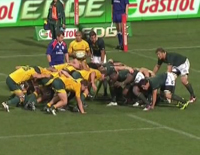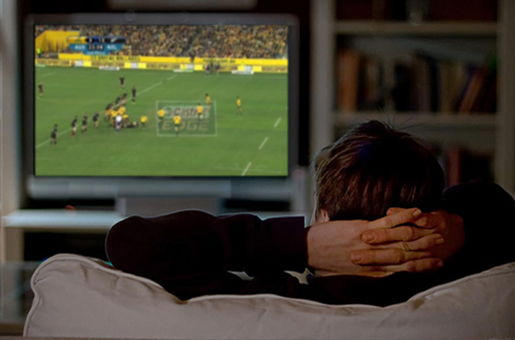A win’s a win so we must all be feeling a little more positive after the Wallabies match on the weekend It’s certainly the first time we’ve seen a smile from Robbie Deans for a while. Here’s what I saw from my couch.
There are some positives to talk about but let’s be realistic – the Wallabies’ first-half performance was at best ordinary and the Springboks’ performance was pretty poor, so there’s plenty to work on before the match against Argentina this weekend.
Following on from my Wallabies Fightback series last week I’m going to review the Wallabies’ performance in some of the key areas I discussed.
The Wallabies attempted only one first phase backline play in the match – a cut pass from Quade Cooper in between the two centres to Dom Shipperley joining into the line. Whilst it was a very basic play it did get the Wallabies over the gain line and started the possession that led to Scott Higginbotham’s try.
In preparation for the match against the Springboks the Wallaby players and coaches said publicly that they had to improve their kicking performance and they had two weeks to review their performances, agree on a game plan that eliminated the wasteful kicks and practise that game plan. Yet the first time the Wallabies had possession against the Springboks, just 17 seconds into the match, Berrick Barnes opted for a grubber kick from inside his 22, giving the Springboks the ball in really good field position.
In the first half Barnes, Kurtley Beale and Cooper were all guilty of poor decisions with kicks.
Barnes’s kicking in general play is the biggest concern for me. When he receives the ball his first reaction always seems to be to kick and only occasionally does he seem to consider the alternatives, when in fact he needs to look for other opportunities first — and if there are none, then consider a kick.
When Robbie Deans was interviewed at half-time he indicated that he wasn’t happy with the kicking performance and had instructed the players to stop the grubber kicks in the second half, but it amazes me that it even got that far.
The job of a coach is to make sure players understand their own role before a match and how that fits into the game plan. However, once players run out on the field funny things happen and plans can be forgotten under pressure so if players are still making the same mistakes during a match the coach normally uses the radio to send a message out with a runner reminding them of the instructions.
If the pre-game instructions were to not use short kicks, it only took 17 seconds in the match for those instructions to be forgotten. And if messages were sent out with runners they didn’t get through, because those kicks continued throughout the first half — and even in the last minute of the half Beale again opted for a grubber kick, which gave the Springboks possession around the half-way line.
In interviews after the match players indicated that the short kicks were not specifically part of the game plan, so the first-half kicking performance raises a number of questions:
-
Was the game plan to make better decisions regarding kicking rather than being specific about the type of kicks to use and when?
-
If that is the case, shouldn’t the game plan be more specific?
-
If that is not the case, are players not listening to the coaches?
Regardless of the game plan or the messages, the players have to also take some responsibility for the poor decisions. At this level of rugby players shouldn’t need coaches to tell them what’s not working and how to fix the problem. They need to make the necessary adjustments on the field.
If these kicking issues continue again this week against Argentina, personnel changes have to be made.
 The Wallabies won their first opposition lineout of The Rugby Championship in this match – that is, the first lineout where the ball was turned over due to pressure by the Wallabies. That’s a positive, but that single turnover means the Wallabies only won five per cent of the Springboks’ lineouts. The tactic of defending one short on full lineouts that was used against the All Blacks wasn’t used in this match and the lack of pressure on the Springboks was again a result of the Wallabies competing in just 47 per cent of opposition lineouts. That performance is worse than in the two matches against the All Blacks.
The Wallabies won their first opposition lineout of The Rugby Championship in this match – that is, the first lineout where the ball was turned over due to pressure by the Wallabies. That’s a positive, but that single turnover means the Wallabies only won five per cent of the Springboks’ lineouts. The tactic of defending one short on full lineouts that was used against the All Blacks wasn’t used in this match and the lack of pressure on the Springboks was again a result of the Wallabies competing in just 47 per cent of opposition lineouts. That performance is worse than in the two matches against the All Blacks.
When the Springboks won their own lineouts (95%) they also provided clean ball to work with from all of those lineouts. Whilst the Wallabies won 86 per cent of their own lineouts those wins included two lineouts in the first half that did not provide clean ball, so they achieved only 71 per cent clean ball in the match. In the first half the Wallabies achieved only 56 per cent clean ball but that improved in the second half with clean ball from all lineouts.
Without the platform of clean ball from lineouts the Wallabies’ attack options are compromised and allowing such clean possession for the opposition gives them too good a platform from which a more attacking team than the Springboks will punish the Wallabies.
Amazingly the Wallabies fed only three scrums in the match, all in the second half, and the statistics show they won all of those.
In the first scrum the Wallabies moved forward but Ben Alexander’s technique was poor – he over-extended and didn’t chase his feet up under his body, which caused him to collapse his side of the scrum. Fortunately the ball was already at the back and the referee was on the other side of the scrum so there were no repercussions.
In the second and third scrums James Slipper had replaced Alexander at tight head with Benn Robinson back on at loosehead and the Springboks had the Wallabies under pressure. Whilst the Wallabies won the ball in both scrums Slipper’s technique was poor, with the biggest issue being the fact that he moved his outside foot backwards as he engaged in both scrums; his body height and shape were poor and in the second scrum he went down to his knees under the pressure.
In scrums the Springboks fed the Wallabies performed reasonably well. The statistics show that the Springboks lost two of their six completed scrums so won only 67 per cent. The two turnovers came when the Springboks were penalised but the Wallabies were fortunate on both occasions with Tatafu Polota-Nau offending in both scrums, the first when he stood up early and the second when he went to ground.
When we interviewed Andrew Blades last week he told us that his immediate focus was going to be on defensive scrums and regardless of the infringements missed by the referee it appears that work paid off. Hopefully we’ll see a focus on scrum performance on the Wallabies’ feed this week because the technique was poor in this area last week, and Argentina’s scrum looks more potent than the Springboks’.
There were some pleasing signs of a better attacking structure with more players realigning quickly and providing options for quick ball. There was much better usage of the Wallabies’ same-way pattern, although on a few too many occasions just when the Wallabies were starting to drag the Springbok defence towards one side of the field the Wallabies came back the other way. This pattern can be improved further by continuing for another phase or two to the touch line more often.
I was very impressed with the performance from Argentina last week against the All Blacks and if they produce another performance like that they’ll offer a bigger challenge for the Wallabies than the Springboks did. The loss of Will Genia is a major blow, but fortunately the Wallabies are making a bit of a habit of responding better when their backs are against the wall.
[youtube id=”jmUn4wtXr2k” width=”600″ height=”350″]


